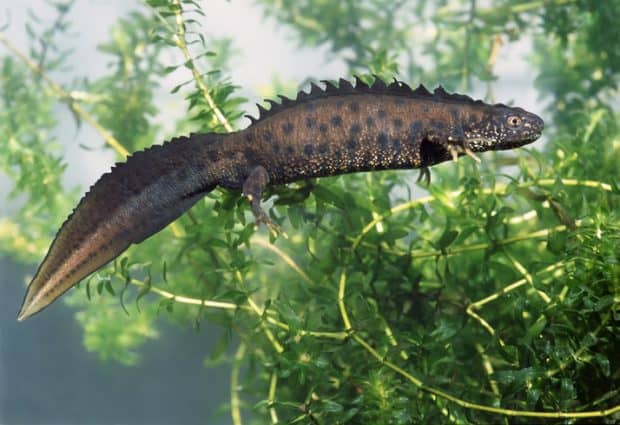Table of Contents
If you have a newt, you obviously need to ensure it is properly cared for. These fascinating creatures do require care and attention, but they are relatively easy to look after. The most important thing with newts is that you create the right environment for it.
As amphibians, newts live both in and out of the water , so you do need to ensure they have access to both. To that end, your tank should contain a ratio of approximately seventy percent water to thirty percent land. To create this ratio, use aquarium gravel to make a slope. This will allow your newt to easily climb in and out of the water at its leisure. Using a filter ensures the water is cleaned, but you will need to change this filter regularly. You can find a great selection of specialist filters on Amazon by clicking here
, so you do need to ensure they have access to both. To that end, your tank should contain a ratio of approximately seventy percent water to thirty percent land. To create this ratio, use aquarium gravel to make a slope. This will allow your newt to easily climb in and out of the water at its leisure. Using a filter ensures the water is cleaned, but you will need to change this filter regularly. You can find a great selection of specialist filters on Amazon by clicking here .
.
Upon creating a suitable environment, next you will need to make sure that you feed your pet regularly. Newts do not require food every day, but they do need to be offered food every two to three days. Newts are carnivores, so you can choose between live and frozen foods such as brine shrimp, bloodworms, mealworms, crickets, and earthworms.
In theory, your newts should be absolutely fine once you have created a suitable environment and are feeding them regularly, but this is not always the case. There are some problems that can crop up even when you do everything right. Below are a few of the problems you might encounter and what could be causing them.
Why is My Newt Floating?
Newts like to dive and swim, so ensuring they have sufficient water to do this is important. A problem that can occur in some newts is the appearance of a swollen abdomen, which makes diving and swimming more difficult for them. Some newts will sometimes appear to be floating in the water in an unnatural position. As you can imagine, this bloating can cause severe difficulties for the newt. It is sometimes caused by egg retention or trapped air.
If you notice that your newt appears to be floating, you can try placing it in a box filled with moss for a couple of days. This appears to help some newts get back to normal. However, if you find that your newt continues to have problems with bloating and is struggling in the water, it might be wise to seek expert advice from an exotic pet vet as some bacterial infections can cause a buildup of gas.

Common Newt 
Alpine Newt 
Eastern Newt Red Eft
Why is My Newt Not Moving?
Some newts become less active if they are handled too much. You might want to handle your newt from time to time but these creatures are not really the type of pet that should be held too often. If you do need to lift your newt from the tank, make sure that you wash your hands beforehand. Use soap and water but ensure that all of this soap is completely rinsed away before you touch the newt.
It is important to use a cupped hand and lift the newt from under its abdomen; never lift it by its tail. Be extremely careful when holding your newt as they can be quite wriggly and could fall to the ground, which, as you can imagine, could cause an injury.
as they can be quite wriggly and could fall to the ground, which, as you can imagine, could cause an injury.
Sadly, a newt that is not moving could indicate a more serious problem. If your newt has not moved for a few days, it could be indicative of an illness or it may be that it has actually died. Remember that newts require both water and land; if your newt does not have access to land, it could become exhausted in the water and die.
Why Are My Newts Dying?
If you have problems with newts dying, then it is important to consider the environment you are keeping them in as well as the type of food you are feeding them. As mentioned above, newts require access to both land and water; if yours cannot access land, it could die.
It is essential that you do not use chlorinated water in your tank. Dechlorinating tablets will help remove those chemicals that tend to be present in tap water. Alternatively, you can use spring water. You will need to change some of the water in the tank on a weekly basis. Even if you are using a filter, this is a requirement as it helps remove debris from the tank. It is recommended that you change out around twenty percent of the water each week. If you are not using a filter, you will need to do this every other day.
A newt that is not eating can become weak and die. If your newt is refusing food, it may be worth experimenting with different food types. For example, if you have been feeding frozen food to your newt, you might want to try some live foods instead. You can purchase live food from an exotic pet store, or you could even dig for worms yourself if you have access to soil. If you do find worms, you should wash them and cut them up if you think they might be too big for your newt.
can become weak and die. If your newt is refusing food, it may be worth experimenting with different food types. For example, if you have been feeding frozen food to your newt, you might want to try some live foods instead. You can purchase live food from an exotic pet store, or you could even dig for worms yourself if you have access to soil. If you do find worms, you should wash them and cut them up if you think they might be too big for your newt.
If your newt continues to refuse food, seek advice from a specialist exotic animal veterinarian.
Photo Attribution:
- Featured Image (Great Crested Newt): http://www.nationalarchives.gov.uk/doc/open-government-licence/version/3/

- Common Newt: Ian Kirk – This file is licensed under the Creative Commons
 Attribution 2.0 Generic
Attribution 2.0 Generic license.
license. - Alpine Newt: Kathy2408 – https://pixabay.com/service/license/
- Eastern Newt Red Eft: lakewooducc – https://pixabay.com/service/license/

